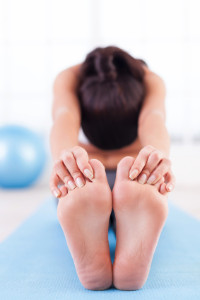Connect With Us
Blog
Which Toes Are Generally Affected by Hammertoe?
 If there are weakened muscles in your toes, a medical condition that is referred to as hammertoe may develop. This can cause the tendons in the toes to become shorter, and they may bend downward, resembling a hammer. The toes that are typically affected are the second and third toes, but it may occur on any toe. It can be caused by genetic factors, or may happen from wearing shoes that do not have adequate room for the toes to move freely in. Patients who have hammertoe can experience difficulty in walking and flexing the feet, and corns and calluses may develop on top of the toes. When shoes that are worn fit properly, this condition could be prevented. Additionally, some patients find mild relief when shoe inserts or toe pads are worn. If you are afflicted with hammertoe, it is strongly suggested that you seek the counsel of a podiatrist who can properly treat this uncomfortable condition.
If there are weakened muscles in your toes, a medical condition that is referred to as hammertoe may develop. This can cause the tendons in the toes to become shorter, and they may bend downward, resembling a hammer. The toes that are typically affected are the second and third toes, but it may occur on any toe. It can be caused by genetic factors, or may happen from wearing shoes that do not have adequate room for the toes to move freely in. Patients who have hammertoe can experience difficulty in walking and flexing the feet, and corns and calluses may develop on top of the toes. When shoes that are worn fit properly, this condition could be prevented. Additionally, some patients find mild relief when shoe inserts or toe pads are worn. If you are afflicted with hammertoe, it is strongly suggested that you seek the counsel of a podiatrist who can properly treat this uncomfortable condition.
Hammertoes can be a painful condition to live with. For more information, contact one of our podiatrists of Foot & Ankle Associates of Maine. Our doctors will answer any of your foot- and ankle-related questions.
Hammertoe
Hammertoe is a foot deformity that occurs due to an imbalance in the muscles, tendons, or ligaments that normally hold the toe straight. It can be caused by the type of shoes you wear, your foot structure, trauma, and certain disease processes.
Symptoms
- Painful and/or difficult toe movement
- Swelling
- Joint stiffness
- Calluses/Corns
- Physical deformity
Risk Factors
- Age – The risk of hammertoe increases with age
- Sex – Women are more likely to have hammertoe compared to men
- Toe Length – You are more likely to develop hammertoe if your second toe is longer than your big toe
- Certain Diseases – Arthritis and diabetes may make you more likely to develop hammertoe
Treatment
If you have hammertoe, you should change into a more comfortable shoe that provides enough room for your toes. Exercises such as picking up marbles may strengthen and stretch your toe muscles. Nevertheless, it is important to seek assistance from a podiatrist in order to determine the severity of your hammertoe and see which treatment option will work best for you.
If you have any questions, please feel free to contact our office located in Brunswick, ME . We offer the newest diagnostic and treatment technologies for all your foot care needs.
Toe Stretching Can Help Strengthen the Feet
 The toes play an important role in maintaining balance in the body. When you take your shoes off and stand up, it is natural for the toes to turn upward. It is said when toes are held in one position too often, the muscles tighten and don't return to normal length. When the toes have adequate room to move freely, specific foot conditions may be prevented such as athlete’s foot, hammertoe, and corns. Research has shown that it is beneficial to frequently stretch the toes, and this can be accomplished in a variety of ways. One effective toe stretch happens when the toes are bent downward, this stretches the top of the foot. Additionally, you can pull the big toe and the little toe away from each other at once, restoring healthy width to the front of the foot. If you would like to learn more about the benefits of stretching your toes, please consult with your local podiatrist.
The toes play an important role in maintaining balance in the body. When you take your shoes off and stand up, it is natural for the toes to turn upward. It is said when toes are held in one position too often, the muscles tighten and don't return to normal length. When the toes have adequate room to move freely, specific foot conditions may be prevented such as athlete’s foot, hammertoe, and corns. Research has shown that it is beneficial to frequently stretch the toes, and this can be accomplished in a variety of ways. One effective toe stretch happens when the toes are bent downward, this stretches the top of the foot. Additionally, you can pull the big toe and the little toe away from each other at once, restoring healthy width to the front of the foot. If you would like to learn more about the benefits of stretching your toes, please consult with your local podiatrist.
Stretching the feet is a great way to prevent injuries. If you have any concerns with your feet consult with one of our podiatrists from Foot & Ankle Associates of Maine. Our doctors will assess your condition and provide you with quality foot and ankle treatment.
Stretching the Feet
Stretching the muscles in the foot is an important part in any physical activity. Feet that are tight can lead to less flexibility and make you more prone to injury. One of the most common forms of foot pain, plantar fasciitis, can be stretched out to help ease the pain. Stretching can not only ease pain from plantar fasciitis but also prevent it as well. However, it is important to see a podiatrist first if stretching is right for you. Podiatrists can also recommend other ways to stretch your feet. Once you know whether stretching is right for you, here are some excellent stretches you can do.
- Using a foam roller or any cylindrical object (a water bottle or soda can will do), roll the object under your foot back and forth. You should also exert pressure on the object. Be sure to do this to both feet for a minute. Do this exercise three times each.
- Similar to the previous one, take a ball, such as a tennis ball, and roll it under your foot while seated and exert pressure on it.
- Grab a resistance band or towel and take a seat. If you are using a towel, fold it length wise. Next put either one between the ball of your foot and heel and pull with both hands on each side towards you. Hold this for 15 seconds and then switch feet. Do this three times for each foot.
- Finally hold your big toe while crossing one leg over the other. Pull the toe towards you and hold for 15 seconds. Once again do this three times per foot.
It is best to go easy when first stretching your foot and work your way up. If your foot starts hurting, stop exercising and ice and rest the foot. It is advised to then see a podiatrist for help.
If you have any questions, please feel free to contact our office located in Brunswick, ME . We offer the newest diagnostic and treatment technologies for all your foot care needs.
Before you start dancing...
Types of Foot Pain
 The feet are comprised of numerous bones, tendons, and ligaments, and are considered to be the foundation of the body. It is important to maintain proper foot care, as this can help to prevent different types of foot pain from occurring. The condition that is known as athlete’s foot may cause severe itching between the toes and on the bottom of the feet. It is caused by a fungus that lives in warm and damp environments, and may be avoided if appropriate shoes are worn while in public areas. A large bump that forms on the side of the big toe may be a bunion, and can develop from genetic factors, or from wearing shoes that do not fit correctly. Ingrown toenails often produce pain and discomfort, and may be avoided when the toenails are trimmed properly. If you have any type of foot pain, it is strongly suggested that you consult with a podiatrist who can offer the best course of treatment for you.
The feet are comprised of numerous bones, tendons, and ligaments, and are considered to be the foundation of the body. It is important to maintain proper foot care, as this can help to prevent different types of foot pain from occurring. The condition that is known as athlete’s foot may cause severe itching between the toes and on the bottom of the feet. It is caused by a fungus that lives in warm and damp environments, and may be avoided if appropriate shoes are worn while in public areas. A large bump that forms on the side of the big toe may be a bunion, and can develop from genetic factors, or from wearing shoes that do not fit correctly. Ingrown toenails often produce pain and discomfort, and may be avoided when the toenails are trimmed properly. If you have any type of foot pain, it is strongly suggested that you consult with a podiatrist who can offer the best course of treatment for you.
Foot Pain
Foot pain can be extremely painful and debilitating. If you have a foot pain, consult with one of our podiatrists from Foot & Ankle Associates of Maine. Our doctors will assess your condition and provide you with quality foot and ankle treatment.
Causes
Foot pain is a very broad condition that could be caused by one or more ailments. The most common include:
- Bunions
- Hammertoes
- Plantar Fasciitis
- Bone Spurs
- Corns
- Tarsal Tunnel Syndrome
- Ingrown Toenails
- Arthritis (such as Gout, Rheumatoid, and Osteoarthritis)
- Flat Feet
- Injury (from stress fractures, broken toe, foot, ankle, Achilles tendon ruptures, and sprains)
- And more
Diagnosis
To figure out the cause of foot pain, podiatrists utilize several different methods. This can range from simple visual inspections and sensation tests to X-rays and MRI scans. Prior medical history, family medical history, and any recent physical traumatic events will all be taken into consideration for a proper diagnosis.
Treatment
Treatment depends upon the cause of the foot pain. Whether it is resting, staying off the foot, or having surgery; podiatrists have a number of treatment options available for foot pain.
If you have any questions, please feel free to contact our office located in Brunswick, ME . We offer the newest diagnostic and treatment technologies for all your foot care needs.

